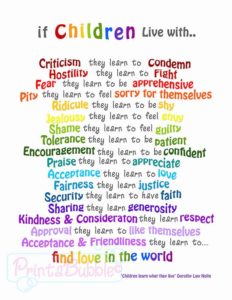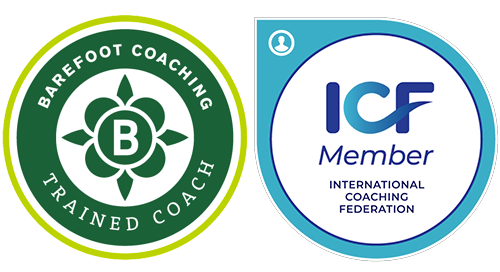How do your children see you? Our behaviour and attitude matters!
Some years ago I came across the poem “Children learn what they live” by Dorothy Law Nolte. It resonated greatly with me, especially as a mother of two primary school children. I printed it off, framed it and put it in the hallway to be a constant reminder. As a life coach, I am often contacted by parents who are worried that their once confident, care free and happy teenager has become the exact opposite. Withdrawn, anxious, with low motivation and very low confidence.

My advice always is to acknowledge these changes and ‘nip them in the bud’ hopefully before they take hold. Remember, it’s difficult growing up and as parents we are there to advise, encourage and support. Most important of all, to be a positive role model. Children learn from what they see, hear and feel as they grow up. I don’t just mean the obvious, like working hard at school and getting a job. I mean being a positive role model with our attitudes as well as how we behave and approach our lives.
The Comparison Syndrome – I’ll never be good enough
One of the most common traits I see when I talk to teenagers who are struggling with self-esteem and confidence issues is that they think everyone is better, more attractive, luckier and cleverer than them. I don’t think it is just social media that is increasing this but it definitely has a lot to do with it. They are never alone and they can constantly see how amazing everyone else’s lives are. If they aren’t comparing themselves they will be having several conversations at once with different individuals or groups of people. The point here being they are spending more time in the virtual world than in the real and present one.
Watch those Algorithms
How much control do you take over your children’s social media usage? If you think this isn’t a problem please watch “The Social Dilemma” a documentary drama where ‘Tech experts sound the alarm on the dangerous human impact of social networking’. It is very shocking to realise the negative impact this could be having on our children but on our own emotional health too. It is well worth a watch.
I have had teenagers talk openly about how they know they have a problem. They often feel sad and worried whilst they are on their phones. However when we talk about doing other things with friends and family they say their parents are never off their devices either.
What can we do? We can ask ourselves the question, are we a slave to our email, WhatsApp, Instagram, and Facebook? Do we have the screen time of a teenager? If we do then how can we expect our teenager to limit theirs? Harsh but fair.
I feel it is important that we limit how much we are seen to compare and judge our lives to others. If our children often see us judging, criticizing, comparing and showing emotional responses to other peoples lives then can we expect them to be any different?
How do we view the world and the future in front of our children?
The news, journalists and much of what we hear, see and read is designed to get a reaction. Any reaction is good because it means we are being influenced and that is how money and connections are made. I am not being political at all but a lot of the influencers are negative and catastrophic and this can have a very negative effect on our emotional health. This releases cortisol in our bodies which isn’t good for our overall health.
How much of this negative and fear creating news should we allow into the home? If we let our children see us constantly worrying and catastrophising, they will almost definitely learn this behaviour and feel the fear from us?
I am not advocating a news ban at all. But a news moderation, intermixed with good news and optimistic opinions is a more healthy way to stay informed.
I have talked to teenagers lately who have an overriding fear of the future. They don’t find it easy to see anything positive in their future. I spend some of their sessions helping them to enjoy and appreciate the now. Helping them to be grateful for the good things they are experiencing in the present. Read more about my work with teenagers
Don’t let the ‘Doom’ and the ‘What If’s’ take over family life
How much of this negative and fear-creating news should we allow into the home? If we let our children see us constantly worrying and catastrophising, they will almost definitely learn this behaviour and feel the fear from us: as the poem says “If children live with fear they learn to be apprehensive”. I am not advocating a news ban at all but a news moderation intermixed with good news and optimistic opinions is a more healthy way to stay informed.
It’s sometimes difficult to get a good balance. One morning in our household, it became clear we were getting it wrong. My daughter came downstairs saying she hadn’t slept well, was tossing and turning and worrying about everything. She then, very seriously, asked if we could refrain from watching the news before bed. It was making her worried, sad and she was finding it difficult to sleep. Maybe some of the conversations we have had over the years about looking after our emotional health have paid off and she is now coaching me?
Dealing with the ups and downs
It is important we talk to our children about the ups and downs in life. For example:
- The difficult times of our past and how we came through them.
- How we coped and what we did that helped us.
- How we felt at the time and then after when we were through the worst of it.
- The future possibilities, good and bad.
- Not to dwell on the past and the mistakes we make but learn from them and move forward in a positive way.
As parents we want to be able to assure our children that life has its ups and downs and it is how we react to them and learn to deal with them that matters. If we can encourage our children not fear the future this will help them to become happy and fulfilled adults who enjoy the present
In conclusion, I hope that after reading this blog, you have the time to reflect on the poem ‘Children learn what they live’ as I really believe there is a lot to take from this. To acknowledge that our attitude and how we behave as parents has a huge influence on our children’s emotional health and well-being.



